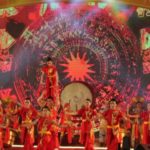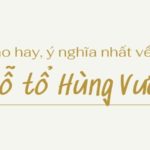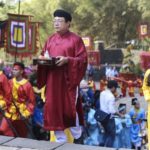The Hung Kings, or Hung Vuong, were the first rulers of Van Lang, the first state of the Vietnamese people. Ho Chi Minh, the beloved leader of modern Vietnam, once said, “The Hung Kings founded our country; we, their descendants, must protect it.” Remembering the Hung Kings is like remembering our ancestors and the founders of our nation. Let’s explore the story of the Hung Kings in today’s article.
1 Who were the Hung Kings?
The Hung Kings (雄王) or Hung Vuong (𤤰雄) were the rulers of Van Lang, the kingdom of the Lac Viet people, dating back to the 7th century BCE to the 3rd century BCE. The story of the Hung Kings is not found in official historical records but has been passed down through Vietnamese folk legends and oral traditions. For the Vietnamese, the Hung Kings represent their ancestors and the founders of their nation, a source of great pride in their unique and ancient civilization.
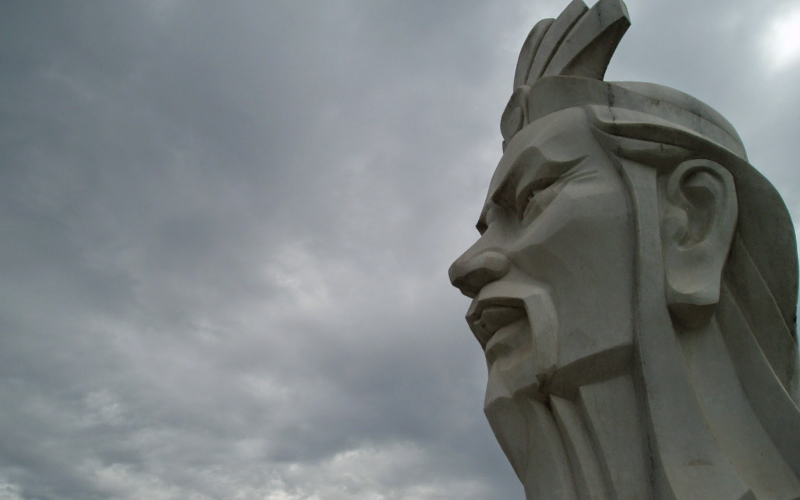 Who were the Hung Kings?
Who were the Hung Kings?
According to the “Dai Viet Su Luoc” and other historical documents, the Hung Kings dynasty spanned 18 generations, with the following rulers:
1. Kinh Duong Vuong, born Loc Tuc, also known as Luc Duc Vuong, ascended the throne at the age of 41 and ruled for 86 years.
2. Lac Long Quan, born Sung Lam, also known as Hung Hien Vuong, ascended the throne at the age of 33 and ruled for 269 years.
3. Hung Quy Vuong, born Hung Lan, ascended the throne at the age of 18 and ruled for 272 years.
4. Hung Hoa Vuong, born Buu Lang, ascended the throne and ruled for 342 years.
5. Hung Hy Vuong, born Bao Lang, ascended the throne at the age of 59 and ruled for 200 years.
6. Hung Hon Vuong, born Long Tien Lang, ascended the throne at the age of 29 and ruled for 81 years.
7. Hung Chieu Vuong, born Quoc Lang, ascended the throne at the age of 18 and ruled for 200 years.
8. Hung Vy Vuong, born Van Lang, ascended the throne at the age of 39 and ruled for 100 years.
9. Hung Dinh Vuong, born Chan Nhan Lang, ascended the throne at the age of 45 and ruled for 80 years.
10. Hung Uy Vuong, born Hoang Long Lang, ruled for 90 years.
11. Hung Trinh Vuong, born Hung Duc Lang, ascended the throne at the age of 51 and ruled for 107 years.
12. Hung Vu Vuong, born Duc Hien Lang, ascended the throne at the age of 52 and ruled for 86 years.
13. Hung Viet Vuong, born Tuan Lang, ascended the throne at the age of 23 and ruled for 115 years.
14. Hung Anh Vuong, born Vien Lang, ascended the throne at the age of 42 and ruled for 99 years.
15. Hung Trieu Vuong, born Khanh Chiêu Lang, ascended the throne at the age of 35 and ruled for 94 years.
16. Hung Tao Vuong, born Duc Quan Lang, ruled for 92 years.
17. Hung Nghi Vuong, born Bao Quang Lang, ascended the throne at the age of 9 and ruled for 160 years.
18. Hung Due Vuong, ascended the throne at the age of 14 and ruled for 150 years.
2 The Legend of the Hung Kings
According to legend, De Minh, the great-grandson of Viêm Đế from the Shennong clan, had a son named De Nghi. During one of his southern expeditions, De Minh fell in love with the daughter of Vu Tien and had a son named Loc Tuc. Loc Tuc was a wise and intelligent man, beloved by De Minh, who wanted him to succeed the throne. However, Loc Tuc humbly refused and insisted that his older brother, De Nghi, should be the rightful heir. De Minh then established De Nghi as the ruler of the northern lands, known as Xich Than, and bestowed upon Loc Tuc the title of Kinh Duong Vuong, ruler of the southern lands, including the Bach Viet tribes, known as Xich Quy.
Kinh Duong Vuong married the daughter of the Dragon King of Dong Dinh Lake, known as Long Nu, and they had a son named Lac Long Quan. Lac Long Quan succeeded his father as the ruler of Xich Quy, while the whereabouts of Kinh Duong Vuong after passing on the throne are unknown. De Nghi passed on the throne to his son, De Lai, who ruled the northern lands. During his reign, De Lai traveled extensively and visited Xich Quy, where he met Lac Long Quan, who had returned to the underwater realm. De Lai asked his daughter, Au Co, to stay in Xich Quy.
Lac Long Quan returned and was captivated by Au Co’s beauty. He transformed himself into a handsome and charming man, and Au Co fell in love with him. They married and lived together in Long Trang Mountain for a year, during which Au Co gave birth to a hundred eggs, from which hatched a hundred extraordinary and brave sons.
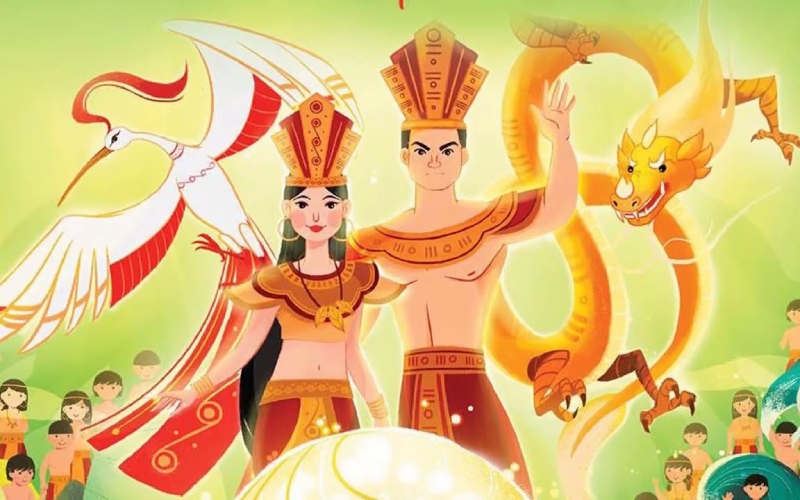 The Legend of the Hung Kings
The Legend of the Hung Kings
As Lac Long Quan spent more time in the underwater realm, Au Co, who was from the northern lands, began to feel homesick and called for Lac Long Quan to return. She said to him:
“I am from the North, and I long to return to my homeland. With a hundred sons and no means to care for them, I ask that you not abandon us, leaving me as a wife without a husband and a mother without a family.”
Lac Long Quan replied:
“I am a dragon, born of the water tribe, and you are a fairy, born of the earth. Our natures are different, and though the union of yin and yang brought us together and gave us children, our paths are not meant to be the same. Fire and water cannot coexist for long. Now we must part ways. I will take fifty sons with me to the underwater realm, and you shall keep the other fifty on land. We will divide the land and rule over our respective realms, but we shall remain connected and support each other in times of need.”
Au Co and her fifty sons remained in Phong Chau, and the eldest son was proclaimed king, taking the title of Hung Vuong.
Hung Vuong established the kingdom of Van Lang and divided the land into 15 regions: Giao Chi, Chu Dien, Vu Ninh, Phuc Loc, Viet Thuong, Ninh Hai, Duong Tuyen, Luc Hai, Vu Dinh, Hoai Hoan, Cuu Chan, Binh Van, Tan Hung, and Cuu Duc, with the capital in Phong Chau, the land of Van Lang.
3 The Legendary Achievements of the Hung Kings
The kingdom of Van Lang encompassed the Red River Delta region, bordering Au Viet to the northeast, modern-day northern Vietnamese provinces and parts of Guangxi, China to the northwest, the East Sea to the east, and the Hoang Lien Son mountain range (in present-day Lao Cai and Son La) to the west. It also shared a southern border with Ho Ton Tinh, an ancient Champa kingdom. The population of Van Lang was estimated to be between 400,000 and 500,000 people, mainly concentrated in the Red River and Ma River basins.
The Hung Kings assigned their younger brothers to govern the different regions, with the second-youngest serving as the military commander (Lac Tuong) and the third-youngest as the civil administrator (Lac Hau). The king’s sons were known as Quan Lang, while his daughters were called Mi Nuong. The head of the administrative department was called Bo Chinh, and servants and slaves were referred to as no ty. The people addressed the king as “khoi,” and the royal lineage was known as “phu dao,” with each generation assuming the title of Hung Vuong.
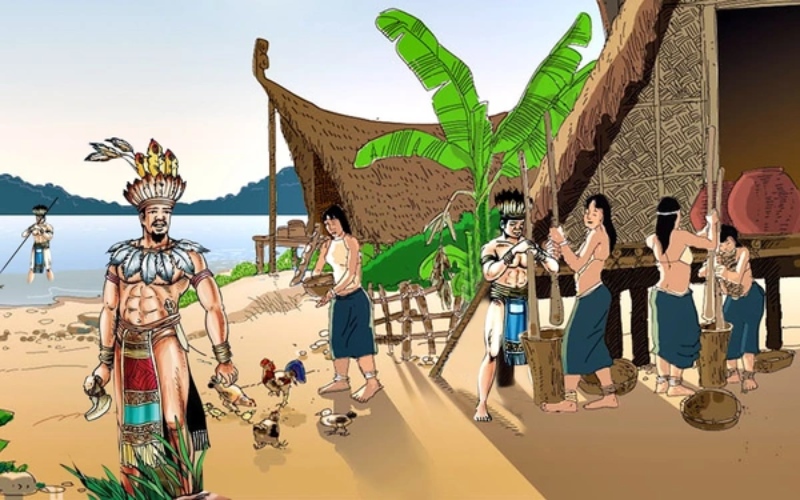 The Legendary Achievements of the Hung Kings
The Legendary Achievements of the Hung Kings
The “Dai Viet Su Ky Toan Thu” chronicles the early history of Van Lang under the Hung Kings, while the “Linh Nam Chich Quai” includes a section titled “Truyen Hong Bang.” According to the “Khâm Định Việt Sử Thông Giám Cương Mục,” which references the “An Nam Chí Nguyên” by Cao Hùng Trưng: “Before Giao Chi became a district, there was a field called Lac, which was cultivated according to the tides. The people who cultivated this field were called Lac Dan, and their ruler was called Lac Vuong. His assistant was called Lac Tuong, and they both used green copper seals. The country was called Van Lang, and its people were simple and honest, without a written language, using knotted strings to record information. There were eighteen generations of Hung Kings.”
Some historical sources describe the territory of the Hung Kings as extending to Ba Shu (Sichuan) in the west, Dongting Lake in the north, and the kingdom of Ho Ton, or Champa, in the south. However, this is a misconception, as these territories belonged to the ancient kingdom of Xich Quy, which was one of the many kingdoms of the Bach Viet people, including the Lac Viet, who are the ancestors of the modern Kinh people. The Lac Viet and Au Viet were two of the Bach Viet tribes living in the southern regions. Later, An Duong Vuong, the king of Au Viet (located northwest of Van Lang), defeated the Hung Kings and established the kingdom of Au Lac. The population of Au Lac during this time was also around 700,000 to 800,000 people. If the territory of Van Lang extended to Ba Shu and Dongting Lake, it would have included significant portions of modern-day Chinese provinces such as Guizhou, Hunan, Yunnan, and Guangxi.
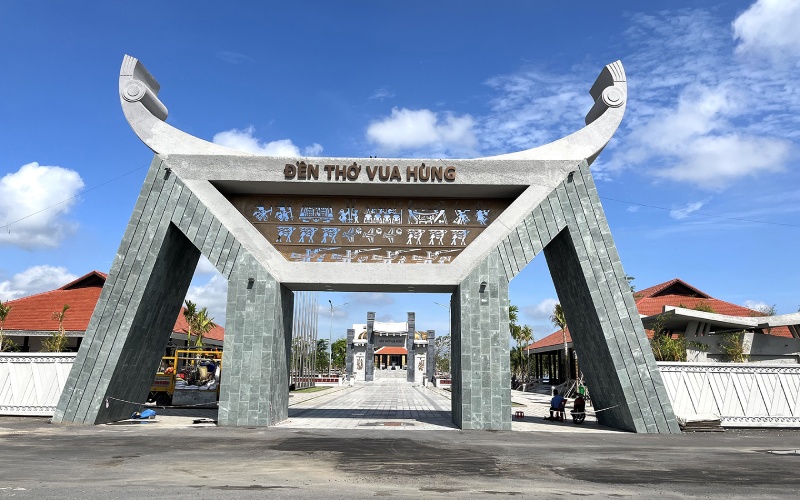 Hung King Temple in Can Tho
Hung King Temple in Can Tho
According to legend, in the year 2557 BCE, during the reign of King Tang Yao, the Hung Kings sent an envoy to present a sacred turtle to King Yao. This turtle was believed to be over a thousand years old, measuring over three meters in length, and its shell was inscribed with knowledge from the beginning of time. King Yao had the inscriptions copied, creating the “Quy Lich” or “Turtle Calendar.”
Learn more about: The Origin and Significance of the 10th of March
This concludes our exploration of the Hung Kings and the legends surrounding their establishment of the Vietnamese nation. Stay tuned for more informative articles from us.
The King Hung Festival Holiday Schedule for 2024: A One-Day Break
The Hung Kings’ Death Anniversary is a significant national holiday in Vietnam, honoring the founding monarchs of the nation, the Hung Kings. This annual observance commemorates their contributions to the country’s establishment and rich history. But when is Hung Kings’ Death Anniversary in 2024, and is it a day off from work?
The Hùng Kings’ Festival: Origins and Significance of the 10th of March
The Hung Kings’ Death Anniversary, also known as the Hung Temple Festival or National Commemoration Day, is one of Vietnam’s most important national holidays. Today, on the 10th of March, we honor and pay respect to the Hung Kings, the legendary founders and first rulers of Van Lang, the ancient name of Vietnam. This annual tradition is a testament to our nation’s rich history and cultural heritage, as we remember and celebrate the contributions of these revered ancestors.

























